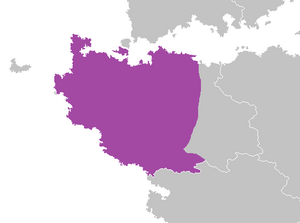Symmerian Khanate: Difference between revisions
No edit summary |
No edit summary |
||
| (One intermediate revision by the same user not shown) | |||
| Line 53: | Line 53: | ||
The Makedonians were responsible for administering north-west Siduri eastward until the Kurilla Mountains, which had been the norm for over a thousand years. However the loss of prestige and wealth that followed their defeat at the [[Battle of Nemaro (1305)|Battle of Nemaro]] stymied the effectiveness of Makedonian rule. Between the 15th and 16th Centuries Makedonian social influence began to wane significantly as Slavic and Ruvelkan language and culture steadily developed and grew, resulting in an increasingly isolated government that did not reflect the customs and norms of its subjects. | The Makedonians were responsible for administering north-west Siduri eastward until the Kurilla Mountains, which had been the norm for over a thousand years. However the loss of prestige and wealth that followed their defeat at the [[Battle of Nemaro (1305)|Battle of Nemaro]] stymied the effectiveness of Makedonian rule. Between the 15th and 16th Centuries Makedonian social influence began to wane significantly as Slavic and Ruvelkan language and culture steadily developed and grew, resulting in an increasingly isolated government that did not reflect the customs and norms of its subjects. | ||
In | In 1453 the [[Makedonian Rebellion]] resulted in the temporary overthrow of Arkoennite rule over Syara. Makedonian hopes that they would re-establish their dominion over Syara and Ruvelka were quickly undercut by the refusal of the Ruvelkan-Syaran states to support their venture, instead allying with the Arkoennites. In 1454 the Arkoennites invaded [[Makedon]] and sacked the capital of Parilla, bringing an end to the rebellion. This date has been used by some historians to mark the definative end of the Makedonian Empire. With the Makedonians subjugated once more and unable to be trusted, the Arkoennite Khan forced the wedding of [[Mikhail Baligov]] of [[Galania]] with [[Réka Prohászka]] of the [[Principality of Debrecen]], forming what became known as the [[Rioni Union]] in 1456. | ||
Historians disagree on the exact duration of the Khanate. Modern histography generally holds that the Makedonian Khanate ended in 1456with the formation of the Rioni Union. Makedonian historians largely do not recognize the Khanate in a similar manner in which they do not recognize the Makedonian Empire itself, instead considering the Realm as one continuous entity. The Arkoennites did not consider the Rioni Union a separate state and continued to refer to the region as the Makedonian Khanate up until the dissolution of the Akroennite Empire itself. | Historians disagree on the exact duration of the Khanate. Modern histography generally holds that the Makedonian Khanate ended in 1456with the formation of the Rioni Union. Makedonian historians largely do not recognize the Khanate in a similar manner in which they do not recognize the Makedonian Empire itself, instead considering the Realm as one continuous entity. The Arkoennites did not consider the Rioni Union a separate state and continued to refer to the region as the Makedonian Khanate up until the dissolution of the Akroennite Empire itself. | ||
[[Category:Syara]] | [[Category:Syara]] | ||
Latest revision as of 18:01, 1 March 2024
Makedonian Khanate | |||||||||
|---|---|---|---|---|---|---|---|---|---|
| 1305–1456 | |||||||||
|
Flag | |||||||||
 Territory administered by the Khanate | |||||||||
| Capital | Parilla | ||||||||
| Common languages | Makedonian Proto-Syaran Early Ruvelkan | ||||||||
| Religion | Zobethos | ||||||||
| Demonym(s) | Makedonian | ||||||||
| Government | Tributary State | ||||||||
| Basileus | |||||||||
• 1305 - 1319 | Myrtilos | ||||||||
• 1441 - 1454 | Zenko II | ||||||||
| Historical era | Medieval | ||||||||
• Established | 1305 | ||||||||
• Reformed as Rioni Union | 1456 | ||||||||
| Currency | Drachma | ||||||||
| |||||||||
The Makedonian Khanate was an administrative division and tributary state of the Arkoennite Empire formed following its conquest of the Makedonian Empire in 1305. Overseen by an Arkoennite delegation, the Makedonian Zelusian Dynasty was tasked with enforcing Arkoennite rule over Syara and western Ruvelka, collecting taxes for annual tribute to Arkoenn while maintaing generaly stability across the Khanate. The Makedonians were also responsible for providing troops, ships, and supplies for the Arkoennites when called upon. The relationship was effectively a reversal of the Makedonian Empire, where Makedon had collected tribute and levied military forces from the Arkoennites.
The Makedonians were responsible for administering north-west Siduri eastward until the Kurilla Mountains, which had been the norm for over a thousand years. However the loss of prestige and wealth that followed their defeat at the Battle of Nemaro stymied the effectiveness of Makedonian rule. Between the 15th and 16th Centuries Makedonian social influence began to wane significantly as Slavic and Ruvelkan language and culture steadily developed and grew, resulting in an increasingly isolated government that did not reflect the customs and norms of its subjects.
In 1453 the Makedonian Rebellion resulted in the temporary overthrow of Arkoennite rule over Syara. Makedonian hopes that they would re-establish their dominion over Syara and Ruvelka were quickly undercut by the refusal of the Ruvelkan-Syaran states to support their venture, instead allying with the Arkoennites. In 1454 the Arkoennites invaded Makedon and sacked the capital of Parilla, bringing an end to the rebellion. This date has been used by some historians to mark the definative end of the Makedonian Empire. With the Makedonians subjugated once more and unable to be trusted, the Arkoennite Khan forced the wedding of Mikhail Baligov of Galania with Réka Prohászka of the Principality of Debrecen, forming what became known as the Rioni Union in 1456.
Historians disagree on the exact duration of the Khanate. Modern histography generally holds that the Makedonian Khanate ended in 1456with the formation of the Rioni Union. Makedonian historians largely do not recognize the Khanate in a similar manner in which they do not recognize the Makedonian Empire itself, instead considering the Realm as one continuous entity. The Arkoennites did not consider the Rioni Union a separate state and continued to refer to the region as the Makedonian Khanate up until the dissolution of the Akroennite Empire itself.
